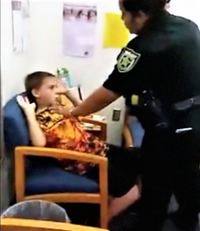Wednesday
Apr262017
“I don’t want to be touched. Please don’t touch me.”
 Wednesday, April 26, 2017 at 3:50PM
Wednesday, April 26, 2017 at 3:50PM  I saw this online. Perhaps you've seen it too. A 10 year old boy with autism returned to his school in Florida for a standardized test in April, six months after having being suspended for hitting and kicking a paraprofessional, leaving scratches and marks. Police officers handcuffed him and took him to spend the night in juvenile hall. He was charged with felony battery.
I saw this online. Perhaps you've seen it too. A 10 year old boy with autism returned to his school in Florida for a standardized test in April, six months after having being suspended for hitting and kicking a paraprofessional, leaving scratches and marks. Police officers handcuffed him and took him to spend the night in juvenile hall. He was charged with felony battery.
You can read more on CNN here and watch the video here.
I don’t know this child, but this incident gave me a lot to think about.
- “I don’t want to be touched. Please don’t touch me.” Here’s a child who has learned – possibly with much effort – to advocate for himself. He’s aware of his sensitivity and he can politely ask others to be considerate and not assault him. And then he’s handcuffed and escorted to the police car. What does he learn from this? Perhaps helplessness. Perhaps that explaining doesn’t do any good, and that fighting back is his only recourse. It doesn’t surprise me that back in November he hit and kicked when the paraprofessional attempted to remove him from the classroom.
- Why else would a 10 year old boy with autism attack a teacher? If not self-protection from a perceived threat, perhaps he was suffering sensory overwhelm (which is often easier to prevent than to recover from), or low blood sugar levels.
- Would penalties make a difference in his outbursts? Hmmm, now that he’s traumatized, I doubt he’d be dealing more effectively with his environment and the people in it.
- Is the solution moving him to a different school? Maybe. I looked up his school, Okeechobee Achievement Academy. The following is an excerpt from the message from the principal: “Our teachers’ use a wide variety of researched based methods including; Behavioral Tools, peer coaching, autism training, counseling and community partnerships to help each student realize their potential. It is hard work that requires lots of the three Ps; patience, persistence, and perseverance. Our mission is to provide our students a positive, stimulating, and safe learning environment that promotes the development of individual responsibility, acceptable social skills, and academic growth. Upon returning to their former schools, our students will be able to make appropriate decisions and experience success in completing their education.” I don’t care to comment on the language imprecisions. What I learned here, however, is that this is a school in which children (probably problematic ones) spend a while, in hope that behavioral tools, peer coaching, autism training and counseling will help them behave better. 10-year-old Johnny, apparently, “had been given plenty of opportunities to change his behavior and has not.” Well, with all due respect to the good people offering coaching and counseling, this often doesn’t work as well as one would hope. It’s been my experience that when the problems are physiological or neurodevelopmental in the first place, they may need to be addressed as such.
- Is the solution home schooling? Perhaps, but I can tell you about my friends who feel unsupported, isolated and financially strapped when there isn’t a school that meets their children’s needs.
- I have to step back and ask the bigger question: what if he weren’t autistic at all? Is a 10 year old mature enough to realize the wrongfulness of his conduct? Is he able to act accordingly? Is he able to understand the legal process he is subjected to and his legal rights? He isn’t, and he won’t be for years.
Please share your thoughts.

Reader Comments (2)
Dror, I completely agree with your thoughtful analysis. My son, who does not speak, was in the emergency room and smacked a nursing assistant in the face. He wasn't arrested, but the assumption was that it was all behavioral. Nobody asked the questions you asked. Why? Why did my son do that? Was it sensory overwhelm from the crazy beeping and other completely over stimulating things that go on in an emergency room? Or was it because the individual, without warning, pulled my son's pants down? I would bristle, too, if somebody yanked my pants down in a room full of people of the opposite sex, without requesting consent or explaining the medical necessity of the action. Or was it the effect of a medication that creates an adverse event of agitation in 43 percent of children who take it? Lots to ponder. Thanks for addressing the issue head-on!
At first I was incredulous that a ten year old (with or without autism) was arrested and charged with a felony. My next thought was, punishment doesn't work. "In practice,...punitive action, rather than evoking repentance and learning, is just as likely to generate resentment and hostility and to reinforce resistance to the very behavior we are seeking," Marshall Rosenberg, Nonviolent Communication: A Language of Life.
The boy's words and actions pointed clearly to his sensory overload. I can only imagine that he was engaging in protective use of force when he punched and kicked his teacher.